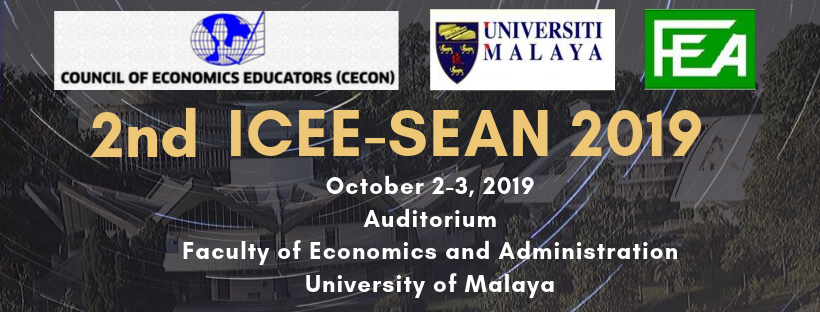Total Visits : 3949
ABOUT 2nd ICEE-SEAN 2019

THEME:
ECONOMICS EDUCATION FOR SUSTAINABILITY IN TOURISM IN SOUTHEAST ASIA
RATIONALE
The University of Malaya will be hosting the 2nd International Conference on Economics Education in Southeast Asian Nations (ICEE-SEAN) on 2-3 October 2019. The theme for this conference is “Economics Education for Sustainability in Tourism in Southeast Asia”. Economics Education can be understood as the study of scarcity, learning how people use and manage resources and how they respond to incentives in terms of economic activities, decision-making processes and outcomes. It adopts a behavioural approach to the study of how individuals and societies manage available limited resources. It also focuses on processes, skills, depositions, and belief systems that learners acquire for their own development in order to make meaningful contributions to society. Therefore, Economics Education can be understood as follows:
- Process – preparation of learners as educators, and the sharing of valuable information to learners, for them to improve their standard of living by engaging in meaningful ventures;
- Science – a body of organized knowledge subjected to scientific assessment; and
- Product – inculcation of saleable values / skills / disposition on learners, which are considered desirable attributes by employers and society.
Generally, Economics Education assists learners in emerging economies, while sustainable tourism is a proven tool for development. According to the United Nations World Tourism Organization (UNWTO), the sustainability principle refers to environmental, economic, and socio-cultural aspects of tourism development, where a suitable balance must be established between these dimensions to guarantee long-term sustainability. When properly managed, sustainable tourism can be inclusive as it contributes to local and national economic development, enhances human capital, improves livelihood for women and rural entrepreneurs, supports cultural heritage and resources, and promotes international understanding.
The Association of Southeast Asian Nations (ASEAN) has given much focus to tourism, as it plays a crucial role in transforming the region. Tourism has long been a key growth sector in ASEAN, one that has proven resilient amid global challenges. Tourism constituted 12 per cent of ASEAN’s total gross domestic product (GDP) in 2015, higher than the world average of 10 per cent and the Asian average of 9 per cent. The wide array of tourist attractions across the region drew 116 million tourists to ASEAN in 2016, compared to 81 million tourists in 2011, a significant 43 percent increase. Despite this positive outlook for tourism, important socio-economic gaps remain within and between ASEAN countries, while debates have emerged about the preservation of cultural heritage and protection of natural resources. The involvement of local and regional stakeholders in tourism-related projects has been emphasized to ensure sustainable development.
For this purpose, the Council of Economics Educators (CECON) has introduced initiatives to foster cooperation among education institutes to deliberate common economic issues. A Common Space of Higher Education in Southeast Asiais being published, while joint research projects, student (and staff) exchange through credit transfer systems and other collaborative ventures have been encouraged. CECON hosted the 1stInternationalConference on Economics Education in Southeast Asian Nations (ICEE-SEAN) in Bangko Sentral Ng Pilipinas, Manila, Philippines on 27-29 November 2018. At that conference, six resource speakers from the Southeast Asian Nations (SEAN; Malaysia, Singapore, the Philippines, Indonesia, Cambodia, and Lao People’s Republic) shared the status, problems, and challenges of Economics Education in their respective countries.
As a member of CECON, and in conjunction with CECON’s 23rd National Conference to be held in November 2019, the Faculty of Economics & Administration, University of Malaya, Kuala Lumpur, Malaysia has been given the privilege to host the 2nd International Conference on Economics Education in Southeast Asian Nations (ICEE-SEAN).This conference is expected to bring together scholars in the disciplines of economics, social sciences and business management, as well as researchers, postgraduate students and policy-makers to discuss Economics Education in the context of tourism sustainability.The Conference serves as an opportunity to assess the contribution of sustainable tourism to trade, economic growth, and well-being of the member states.
Conference Objectives
At the end of the Conference, the participants are expected to:
- Promote and enrich economics and tourism education;
- Encourage economics and tourism education as a key development priority to ensure sustainability;
- Foster dialogues that stimulate the exchange of ideas among educators, researchers, and policy-makers;
- Provide opportunities for scholars to disseminate their research findings on economics and tourism education;
- Compel researchers to derive policy lessons related to the development of tourism in SEAN;
- Enhance the growth of economics and tourism education in SEAN through faculty and student engagement programmes; and
- Form an alliance of Economics Educators in the SEAN region.